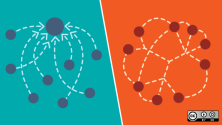Robyn Bergeron gave a Friday talk at Ohio LinuxFest titled "OM NOM - Open marketing--not obscure marketing." This post is based on her talk.
Marketing is typically done in a room of people who are removed from those who develop the things they're marketing. Open marketing (not obscured marketing!) is about turning that paradigm upside-down and doing marketing as openly as development.
Strategic marketing is about choices. You can't please everybody. Contributors and users and everybody else--they're all important. So the key is balancing them and all of their needs. For that you need a strategic plan:
- Where are we?
- Where do we want to go?
- What's the best way to get there?
- How do we get there?
- Getting there!
- Ensure a good arrival.
Why be open? Marketing people are often naturally averse to openness, holding their secrets close. But when you're working in a community, they expect to see a plan and to see what you're doing. It helps everyone inside and outside of your marketing team collaborate. It also lets the communication happen both ways. Those outside of marketing--surprise!--know more about the things that you're marketing. They know things, and they know people. And the project will be better when they're involved.
"Without leaps of imagination or dreaming, we lose the excitement of possibilities. Dreaming, after all, is a form of planning."
-- Gloria Steinem
Once everyone's on board, and you have a plan, you execute--those are the easy parts. but you need a followup. After everything is a go, read what others are saying. Read the mailing lists, Twitter, your IRC channels, web pages, and Wikis. Know what people are saying. Or as Bergeron put it, "Image isn't everything, but it never hurts." That then gives you the opportunity to correct misinformation and keep the lines of communication open.
Bergeron gave a few examples of open marketing projects:
openSUSE
openSUSE did classical marketing in a strategic, community-based way. They allow community members to contribute strategy proposals and acknowledge that doing it this way is new territory for them, but they do it anyway. Or as they described it:
"On strategy in general we said, the broader our strategy is the less realistic it will be to achieve as we do have limited resources. The more focus we get in our strategy the more likely an achievement will be – but as it is about trade offs we will disappoint and maybe lose a number of openSUSE followers."
Then only this past week, the strategy team posted to their news blog that "strategy sucks":
We would like to go back to the start and focus on describing who we are, as a community, instead of finding new ways to go. The input you all have given us by mail, forums, IRC and in person was valuable and we will use that. ...From you all – we will continue to seek your input on it once we post it. By mail, forum, IRC or in person – again. Without your help it won’t be much, so please think about that!
Wikimedia Foundation
The Wikimedia Foundation has embarked on a large, wiki-based (of course) strategy approach. They spent a lot of their time on level-setting deciding how they were governed and how the process would work before they got to work. They planned how to make the plan before they got to the business of actually making the plan.
Their vision:
Imagine a world in which every single human being can freely share in the sum of all knowledge. That's our commitment.
Their process from plan to action involved a year-long process of self-organizing around movement priorities and thinking strategically about fulfilling that vision.
Fedora
Bergeron works on marketing for Fedora. They strive to apply to same FOSS principles that work for software development to the development of marketing. That means collaborating on things like user-friendly release notes, translating for a possible non-technical audience.
Fedora has also been working on strategy, developing a mission, and a still in-progress vision. They've also achieved a vocal and enthusiastic community and next will approach planning the goals for the next few years and choosing milestones.
In summary, community-based strategy is still new for a lot of projects, and community-based strategy isn't well-defined. Communities that are practicing open marketing are keeping an eye on each other to see what works and what doesn't. So if you're embarking on an open marketing plan, remember to document your successes and your failures, not only for your future reference, but for everyone else working openly. And above all, remember the underlying principles of openness and transparency in all you do.
Tools
If you're embarking on open marketing, there are a few tools that can help if you aren't already using them:
- Limesurvey
- Status
- Identi.ca
- Twitter (or as Bergeron put it, "those other microblog folks")
- Facebook (aka "that place where all the farmers and mafia people hang out")
- Mailing lists
- IRC
- Wikis
- Time and to-do tracking
- Trac
- Taskjuggler
Tips
Bergeron also gave a list of tips that would well serve almost any open project, marketing or otherwise. This list should probably be turned into wallpaper for every open source project member:
- Don't be afraid to fail.
- Don't be afraid to detour.
- Don't be afraid to revisit.
- Don't be afraid to let others do things.
- Be OPEN and TRANSPARENT.
- Document, document, document.
- Keep a wish list.
She concluded with this quote from Albert Einstein:
Logic will get you from A to B.
Imagination will take you everywhere.







1 Comment